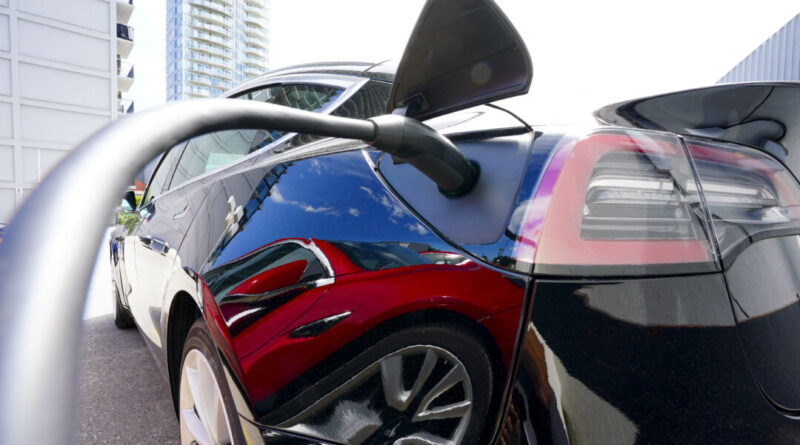The province’s finance minister stated that the purpose of the tax is to ensure that both electric and gas vehicle drivers are treated equally.
Starting Thursday, Albertans who drive electric vehicles will be required to pay an additional $200 when registering their cars with the province.
As of Feb. 13, the new electric vehicle tax in Alberta will be implemented. The finance minister mentioned that the tax amount is comparable to what drivers of traditional internal combustion engine vehicles pay in fuel tax annually.
In a
press release on Feb. 6, Nate Horner stated, “This is a fair way for all drivers to contribute to public services, and to help keep roads and highways safe and smooth.”
He mentioned that Alberta is joining other jurisdictions in North America in introducing this tax to ensure fairness for both electric and gas vehicle drivers.
Exemptions will be provided for owners of hybrid vehicles, electric motorcycles, and electric off-highway vehicles like ATVs.
The tax will be collected through registry agents or online via MyAlberta eService during vehicle registration and annual renewals, the province confirmed.
‘Fairness Concerns’
The electric vehicle (EV) tax was initially announced as part of Alberta’s Budget 2024 published on Feb. 29 last year. It was subsequently approved in the provincial legislature last autumn.
According to the budget’s
fiscal plan for 2024–27, even though the number of EVs in Alberta is currently low, their increasing adoption rate raised concerns about fairness to other vehicle types.
The fiscal plan highlighted that EVs are heavier than similar internal combustion vehicles and cause more wear and tear on provincial roadways without contributing fuel tax. It stated, “While fuel tax revenue is not dedicated to funding construction and maintenance of provincial roads, there are nevertheless fairness concerns with drivers of other vehicles and longer-term challenges associated with declining fuel tax revenue.”
It was estimated that the EV tax would generate $1 million in revenue in 2024–25, $5 million in 2025–26, and $8 million in 2026–27, assuming that EV adoption continues to rise.
In 2022, the federal government introduced an
emissions reduction plan that included phasing out sales of new gasoline or diesel light-duty vehicles in Canada by 2035.
Transport Canada stated, “To help decarbonize the transportation sector, we need to accelerate the adoption of ZEVs [zero-emission vehicles]. That is why the Government of Canada committed to achieve 100% zero-emission vehicle sales by 2035 for all new light-duty vehicles, including interim targets of at least 20% by 2026 and at least 60% by 2030” on their
website.
Battery-electric, plug-in hybrid electric, and hydrogen fuel cell electric vehicles are categorized as
ZEVs. Most personal vehicles, such as cars, SUVs, and light pickup trucks, fall into the
light-duty vehicle category.
A survey conducted by Natural Resources Canada in early 2024 revealed that less than 4 in 10 Canadians (36 percent) are considering purchasing or leasing a ZEV, indicating a decline in interest from 51 percent in 2022.
The report by EKOS Research from Jan. 17 to Feb. 7, 2024, noted that 75 percent of respondents found ZEVs “too expensive,” up from 70 percent in 2022. Additionally, 59 percent mentioned that ZEVs “perform poorly in cold weather,” an increase from 37 percent in 2022, and 56 percent stated that ZEVs “cannot travel far enough on a full charge,” an increase from 49 percent in 2022.
Incentives
To promote the adoption of ZEVs, Ottawa introduced the Incentives for Zero-Emission Vehicles (iZEV) program in May 2019, offering rebates of up to $5,000 to eligible consumers when purchasing or leasing ZEVs.
However, the program was
suspended in mid-January this year, with Transport Canada confirming on its
website that all funds had been allocated. The program was scheduled to pause either on March 31, 2025, or upon the exhaustion of available funding by Canadians.
In a
press release on Jan. 10, Transport Canada acknowledged the success of the program, stating that over 546,000 ZEVs had been sold or leased with incentives since 2019. It mentioned that new ZEV sales represented 11.7 percent market share in 2023, up from 3.1 percent in 2019.
Shortly after the incentives were suspended, automakers
urged Ottawa to halt the EV sales mandates.
Brian Kingston, president and CEO of the Canadian Vehicle Manufacturers’ Association, emphasized, “[A] pause in the Incentives for Zero-Emission Vehicles (iZEV) Program will significantly reduce ZEV sales in Canada. … the federal government’s mandated ZEV sales targets are increasingly unrealistic”
Matthew Horwood and The Canadian Press contributed to this report.





